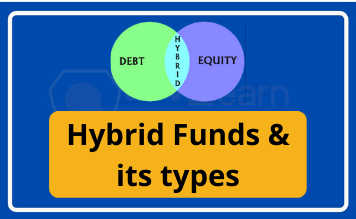Hybrid funds are an investment option that predominantly invests in two or more asset classes. A hybrid fund is considered to be less risky than pure equity funds and more rewarding than pure debt funds. The funds may invest beyond these categories such as gold etc, but most hybrid funds invest in equity and debt securities. These funds are also called asset allocation funds.
Asset Allocation is the decision-making process of how to distribute between different asset classes such as equity and debt which may also include gold and real estate. This is to reduce the concentration of wealth in one asset category and thereby reduce short term volatility in returns.
The allocation to each asset class is decided by the fund manager based upon the investment objective of the fund and the market condition.
Advantages of Hybrid funds
- Access to multiple asset class funds in one fund, the investor who looks to diversify between asset classes will find hybrid funds as a better option. One fund does it all.
- Actively managed hybrid funds provide better risk management options.
- Diversification between asset classes as well as within asset classes is part of hybrid funds. For eg.) Within equity, the fund invests in large, small, and mid-cap stocks.
- Attractive to investors of various risk profiles. Hybrid funds cater to the need of most investors by allocating capital in various investments which offer a better risk-return profile.
Disadvantages of Hybrid funds
- These funds require more active decision making and higher risk management strategies. Opportunities in different asset classes are to be monitored closely and the decision to be taken accordingly.
- The exposure to different asset classes may not suit the investor needs exactly. For eg.) The exposure to equity/ debt may lead to higher risk or lesser returns which might not be of interest to the investor.
Types of Hybrid funds
- Multi-Asset Allocation funds where at least a minimum of 10 percent is invested in each asset class. The maximum allocation into different asset classes depends upon the perception of the fund manager.
- Balanced hybrid funds invest in a minimum of 40 percent and a maximum of 60 percent in debt and equity assets respectively. The objective is to invest in the long-term to generate wealth and reduce risk by investing in debt securities respectively.
- Aggressive hybrid funds are mandated to invest a minimum of 65 percent and a maximum of 80 in the equity asset class. The rest is allocated to debt securities. These funds possess a high return possibility by allocating a minimum capital towards debt securities overall.
- Dynamic asset allocation are funds that shift between 100 percent debt to 100 percent equity depending upon the decision of the fund manager. Asset allocation is purely dependant upon the decision of the fund manager.
- Conservative hybrid funds invest only about 10 to 15 percent of the funds to the equity asset class and the rest 85 to 90 percent is invested in debt securities. The returns are more fixed with little equity portion for extra return than pure debt funds.
- Equity savings funds try to balance return and risk by investing in equity, debt, and as well as derivatives. Derivatives reduces the risk of directly investing in equity. These schemes have 65 to 100 percent exposure towards equity assets.
The performance of such fund categories on different time frames is provided below
Source: Value research
Tax structure of hybrid funds
The hybrid funds are divided into two for tax purposes.
- Funds that have more than 65% of exposure towards the equity asset class. Such funds are classified as equity-oriented schemes.
- Funds that have lesser than 65% of equity are classified as ‘Other schemes’.
For equity-oriented schemes the tax rates applicable are
- Long term capital gains tax rate at 10% for gains from equity-oriented schemes held for more than 1 year.
- Short term capital gains from equity-oriented schemes which are held for less than 1 year is taxed at 15 percent.
For funds classified ‘Other schemes’ the tax rates are
- Long term gains from funds which are held for 3 years or more are taxed at 20 percent after providing indexation.
- Short term gains from funds held for less than 3 years will be included in the income of the investor and taxed at applicable tax rates as per the income tax act.
To read more on management, click here.

